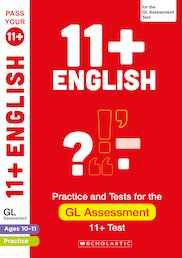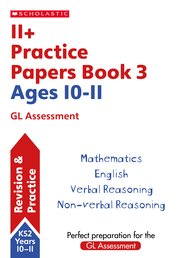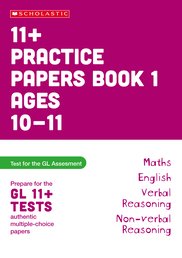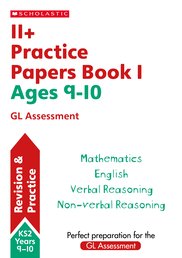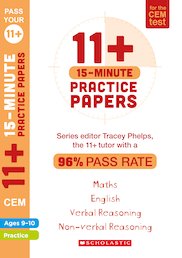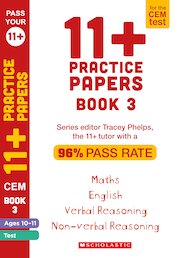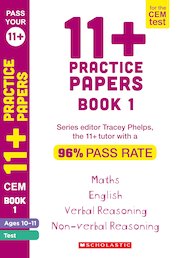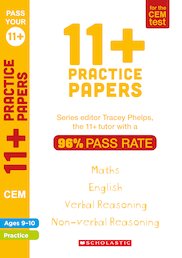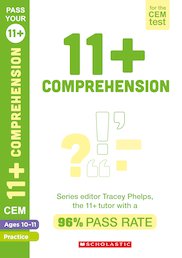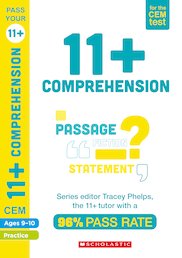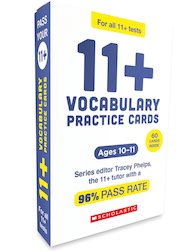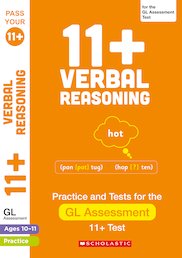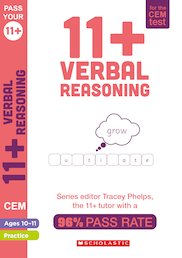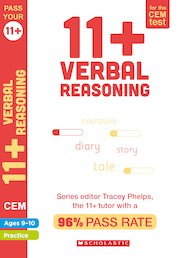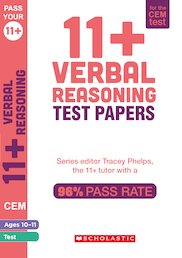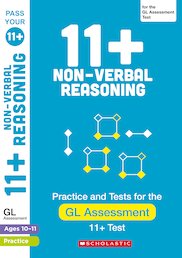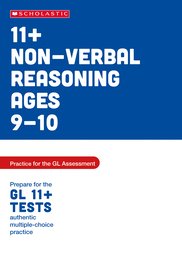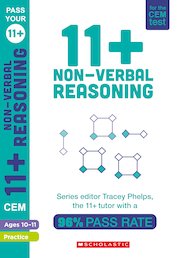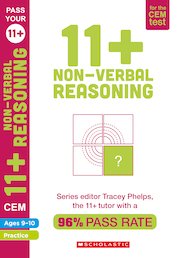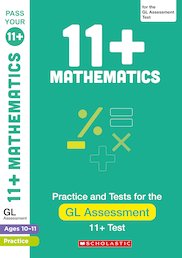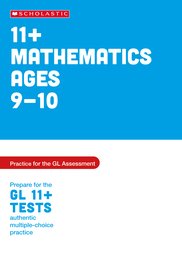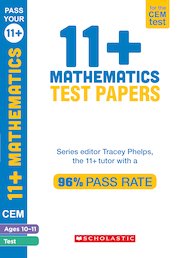Information for Parents – About the 11+
How to help your child prepare for the 11+
What is the 11+?
The 11+ is an entrance exam that is mainly used in parts of the UK that have state-funded grammar schools. It is also used by some selective private schools. The exam is usually taken towards the end of primary school when children are in Year 6. These grammar schools set their own entrance exams.

Grammar schools select their pupils on the strength of their performance in the 11+ entrance exam. Students generally start preparing for the 11+ in Year 4 or 5.
The 11+ exam generally focuses on four key subjects:
- English
- Maths
- Verbal reasoning
- Non-verbal reasoning
The exams in the UK are mainly administered by two exam providers:
- GL Assessment – the most popular 11+ exam provider. GL create and administer the exam for most grammar schools in the UK.
- CEM Assessment – the CEM 11+ exam was created in response to feedback that the exam had become too predictable. The CEM exam is more closely aligned with the National Curriculum.
Is the 11+ Available in My Area?
There are 163 grammar schools throughout England, and they are located in:
Cumbria
Lancashire
Liverpool
Trafford
Wirral
Calderdale
Kirklees
North Yorkshire
Lincolnshire
Birmingham
Telford and Wrekin
Walsall
Warwickshire
Wolverhampton
Essex
Southend-on-Sea
Buckinghamshire
Kent
Medway
Slough
Bournemouth
Devon
Gloucestershire
Plymouth
Poole
Torbay
Wiltshire
Barnet
Bexley
Bromley
Enfield
Kingston upon Thames
Redbridge
Sutton

Some regions use a combination of CEM and GL Assessment, or set their own bespoke assessments. It’s important that you get in touch with your child’s school to confirm which exam board is administering the 11+ in your local area.
Preparing for the 11+ exam
English & Reading
Encouraging your child to read for pleasure is an ideal way to support them in the lead up to their 11+ exam. Reading helps children to expand their vocabulary and broaden their interests. Reading widely can help children become familiar with some of the trickier words that feature in the 11+ exam.
The exam places a big emphasis on English comprehension skills. Questions are likely to be based on a mix of fiction and non-fiction passages to assess children’s inference and deduction skills.
-
 Pass Your 11+: 11+ English Practice and Test for the GL Assessment Ages 10-11
Pass Your 11+: 11+ English Practice and Test for the GL Assessment Ages 10-11
- gbp prices
- Offer price: £6.30
- Rewards/RRP: £6.99
-
 Pass Your 11+: 11+ English Practice and Test for the GL Assessment Ages 09-10
Pass Your 11+: 11+ English Practice and Test for the GL Assessment Ages 09-10
New
- gbp prices
- Offer price: £6.30
- Rewards/RRP: £6.99
-
 Pass Your 11+: 11+ Practice Papers for the GL Assessment Ages 10-11 - Book 3
Pass Your 11+: 11+ Practice Papers for the GL Assessment Ages 10-11 - Book 3
Award-winning author
- gbp prices
- Offer price: £6.30
- Rewards/RRP: £6.99
-
 Pass Your 11+: 11+ Practice Papers for the GL Assessment Ages 10-11 - Book 2
Pass Your 11+: 11+ Practice Papers for the GL Assessment Ages 10-11 - Book 2
Award-winning author
- gbp prices
- Offer price: £6.30
- Rewards/RRP: £6.99
-
 Pass Your 11+: 11+ Practice Papers for the GL Assessment Ages 10-11 - Book 1
Pass Your 11+: 11+ Practice Papers for the GL Assessment Ages 10-11 - Book 1
Award-winning author
- gbp prices
- Offer price: £6.30
- Rewards/RRP: £6.99
-
 Pass Your 11+: 11+ Practice Papers for the GL Assessment Ages 09-10
Pass Your 11+: 11+ Practice Papers for the GL Assessment Ages 09-10
Award-winning author
- gbp prices
- Offer price: £6.30
- Rewards/RRP: £6.99
-
 Pass Your 11+: 11+ 15-Minute Practice Papers for the CEM Test Ages 10-11
Pass Your 11+: 11+ 15-Minute Practice Papers for the CEM Test Ages 10-11
- gbp prices
- Offer price: £6.30
- Rewards/RRP: £6.99
-
 Pass Your 11+: 11+ 15-Minute Practice Papers for the CEM Test Ages 9-10
Pass Your 11+: 11+ 15-Minute Practice Papers for the CEM Test Ages 9-10
- gbp prices
- Offer price: £6.30
- Rewards/RRP: £6.99
-
 Pass Your 11+: 11+ Practice Papers for the CEM Test Ages 10-11 - Book 3
Pass Your 11+: 11+ Practice Papers for the CEM Test Ages 10-11 - Book 3
- gbp prices
- Offer price: £6.30
- Rewards/RRP: £6.99
-
 Pass Your 11+: 11+ Practice Papers for the CEM Test Ages 10-11 - Book 2
Pass Your 11+: 11+ Practice Papers for the CEM Test Ages 10-11 - Book 2
- gbp prices
- Offer price: £6.30
- Rewards/RRP: £6.99
-
 Pass Your 11+: 11+ Practice Papers for the CEM Test Ages 10-11 - Book 1
Pass Your 11+: 11+ Practice Papers for the CEM Test Ages 10-11 - Book 1
- gbp prices
- Offer price: £6.30
- Rewards/RRP: £6.99
-
 Pass Your 11+: 11+ Practice Papers for the CEM Test Ages 9-10
Pass Your 11+: 11+ Practice Papers for the CEM Test Ages 9-10
- gbp prices
- Offer price: £6.30
- Rewards/RRP: £6.99
-
 Pass Your 11+: 11+ English Comprehension Practice and Assessment for the CEM Test Ages 10-11
Pass Your 11+: 11+ English Comprehension Practice and Assessment for the CEM Test Ages 10-11
- gbp prices
- Offer price: £6.30
- Rewards/RRP: £6.99
-
 Pass Your 11+: 11+ English Comprehension Practice and Assessment for the CEM Test Ages 9-10
Pass Your 11+: 11+ English Comprehension Practice and Assessment for the CEM Test Ages 9-10
- gbp prices
- Offer price: £6.30
- Rewards/RRP: £6.99
-
 Pass Your 11+: Vocabulary Flashcards
Pass Your 11+: Vocabulary Flashcards
- gbp prices
- Offer price: £6.30
- Rewards/RRP: £6.99
Verbal Reasoning
Verbal reasoning assesses children’s problem solving skills. You can support your child with lots of practice of questions covering cloze, spelling, vocabulary, synonyms and antonyms.
-
 Pass Your 11+: 11+ Verbal Reasoning Practice and Test for the GL Assessment Ages 10-11
Pass Your 11+: 11+ Verbal Reasoning Practice and Test for the GL Assessment Ages 10-11
- gbp prices
- Offer price: £6.30
- Rewards/RRP: £6.99
-
 Pass Your 11+: 11+ Verbal Reasoning Practice and Test for the GL Assessment Ages 09-10
Pass Your 11+: 11+ Verbal Reasoning Practice and Test for the GL Assessment Ages 09-10
New
- gbp prices
- Offer price: £6.30
- Rewards/RRP: £6.99
-
 Pass Your 11+: 11+ Practice Papers for the GL Assessment Ages 10-11 - Book 3
Pass Your 11+: 11+ Practice Papers for the GL Assessment Ages 10-11 - Book 3
Award-winning author
- gbp prices
- Offer price: £6.30
- Rewards/RRP: £6.99
-
 Pass Your 11+: 11+ Practice Papers for the GL Assessment Ages 10-11 - Book 2
Pass Your 11+: 11+ Practice Papers for the GL Assessment Ages 10-11 - Book 2
Award-winning author
- gbp prices
- Offer price: £6.30
- Rewards/RRP: £6.99
-
 Pass Your 11+: 11+ Practice Papers for the GL Assessment Ages 10-11 - Book 1
Pass Your 11+: 11+ Practice Papers for the GL Assessment Ages 10-11 - Book 1
Award-winning author
- gbp prices
- Offer price: £6.30
- Rewards/RRP: £6.99
-
 Pass Your 11+: 11+ Practice Papers for the GL Assessment Ages 09-10
Pass Your 11+: 11+ Practice Papers for the GL Assessment Ages 09-10
Award-winning author
- gbp prices
- Offer price: £6.30
- Rewards/RRP: £6.99
-
 Pass Your 11+: 11+ 15-Minute Practice Papers for the CEM Test Ages 10-11
Pass Your 11+: 11+ 15-Minute Practice Papers for the CEM Test Ages 10-11
- gbp prices
- Offer price: £6.30
- Rewards/RRP: £6.99
-
 Pass Your 11+: 11+ 15-Minute Practice Papers for the CEM Test Ages 9-10
Pass Your 11+: 11+ 15-Minute Practice Papers for the CEM Test Ages 9-10
- gbp prices
- Offer price: £6.30
- Rewards/RRP: £6.99
-
 Pass Your 11+: 11+ Practice Papers for the CEM Test Ages 10-11 - Book 3
Pass Your 11+: 11+ Practice Papers for the CEM Test Ages 10-11 - Book 3
- gbp prices
- Offer price: £6.30
- Rewards/RRP: £6.99
-
 Pass Your 11+: 11+ Practice Papers for the CEM Test Ages 10-11 - Book 2
Pass Your 11+: 11+ Practice Papers for the CEM Test Ages 10-11 - Book 2
- gbp prices
- Offer price: £6.30
- Rewards/RRP: £6.99
-
 Pass Your 11+: 11+ Practice Papers for the CEM Test Ages 10-11 - Book 1
Pass Your 11+: 11+ Practice Papers for the CEM Test Ages 10-11 - Book 1
- gbp prices
- Offer price: £6.30
- Rewards/RRP: £6.99
-
 Pass Your 11+: 11+ Practice Papers for the CEM Test Ages 9-10
Pass Your 11+: 11+ Practice Papers for the CEM Test Ages 9-10
- gbp prices
- Offer price: £6.30
- Rewards/RRP: £6.99
-
 Pass Your 11+: 11+ Verbal Reasoning Practice and Assessment for the CEM Test Ages 10-11
Pass Your 11+: 11+ Verbal Reasoning Practice and Assessment for the CEM Test Ages 10-11
- gbp prices
- Offer price: £6.30
- Rewards/RRP: £6.99
-
 Pass Your 11+: 11+ Verbal Reasoning Practice and Assessment for the CEM Test Ages 9-10
Pass Your 11+: 11+ Verbal Reasoning Practice and Assessment for the CEM Test Ages 9-10
- gbp prices
- Offer price: £6.30
- Rewards/RRP: £6.99
-
 Pass Your 11+: 11+ Verbal Reasoning Tests Ages 10-11
Pass Your 11+: 11+ Verbal Reasoning Tests Ages 10-11
- gbp prices
- Offer price: £6.30
- Rewards/RRP: £6.99
Non-verbal Reasoning
Non-verbal reasoning is used to determine children’s potential to think logically and recognise patterns. Non-verbal reasoning is not part of the National Curriculum which is why it’s important to practice these kinds of questions at home. Regular practice will help boost children’s familiarity and confidence ahead of the exam. Key non-verbal reasoning topics included in the 11+ test include 3D and spatial reasoning.
-
 Pass Your 11+: 11+ Non-verbal Reasoning Practice and Test for the GL Assessment Ages 10-11
Pass Your 11+: 11+ Non-verbal Reasoning Practice and Test for the GL Assessment Ages 10-11
Award-winning author
- gbp prices
- Offer price: £6.30
- Rewards/RRP: £6.99
-
 Pass Your 11+: 11+ Non-verbal Reasoning Practice and Test for the GL Assessment Ages 09-10
Pass Your 11+: 11+ Non-verbal Reasoning Practice and Test for the GL Assessment Ages 09-10
New
- gbp prices
- Offer price: £6.30
- Rewards/RRP: £6.99
-
 Pass Your 11+: 11+ Practice Papers for the GL Assessment Ages 10-11 - Book 3
Pass Your 11+: 11+ Practice Papers for the GL Assessment Ages 10-11 - Book 3
Award-winning author
- gbp prices
- Offer price: £6.30
- Rewards/RRP: £6.99
-
 Pass Your 11+: 11+ Practice Papers for the GL Assessment Ages 10-11 - Book 2
Pass Your 11+: 11+ Practice Papers for the GL Assessment Ages 10-11 - Book 2
Award-winning author
- gbp prices
- Offer price: £6.30
- Rewards/RRP: £6.99
-
 Pass Your 11+: 11+ Practice Papers for the GL Assessment Ages 10-11 - Book 1
Pass Your 11+: 11+ Practice Papers for the GL Assessment Ages 10-11 - Book 1
Award-winning author
- gbp prices
- Offer price: £6.30
- Rewards/RRP: £6.99
-
 Pass Your 11+: 11+ Practice Papers for the GL Assessment Ages 09-10
Pass Your 11+: 11+ Practice Papers for the GL Assessment Ages 09-10
Award-winning author
- gbp prices
- Offer price: £6.30
- Rewards/RRP: £6.99
-
 Pass Your 11+: 11+ 15-Minute Practice Papers for the CEM Test Ages 10-11
Pass Your 11+: 11+ 15-Minute Practice Papers for the CEM Test Ages 10-11
- gbp prices
- Offer price: £6.30
- Rewards/RRP: £6.99
-
 Pass Your 11+: 11+ 15-Minute Practice Papers for the CEM Test Ages 9-10
Pass Your 11+: 11+ 15-Minute Practice Papers for the CEM Test Ages 9-10
- gbp prices
- Offer price: £6.30
- Rewards/RRP: £6.99
-
 Pass Your 11+: 11+ Practice Papers for the CEM Test Ages 10-11 - Book 3
Pass Your 11+: 11+ Practice Papers for the CEM Test Ages 10-11 - Book 3
- gbp prices
- Offer price: £6.30
- Rewards/RRP: £6.99
-
 Pass Your 11+: 11+ Practice Papers for the CEM Test Ages 10-11 - Book 2
Pass Your 11+: 11+ Practice Papers for the CEM Test Ages 10-11 - Book 2
- gbp prices
- Offer price: £6.30
- Rewards/RRP: £6.99
-
 Pass Your 11+: 11+ Practice Papers for the CEM Test Ages 10-11 - Book 1
Pass Your 11+: 11+ Practice Papers for the CEM Test Ages 10-11 - Book 1
- gbp prices
- Offer price: £6.30
- Rewards/RRP: £6.99
-
 Pass Your 11+: 11+ Practice Papers for the CEM Test Ages 9-10
Pass Your 11+: 11+ Practice Papers for the CEM Test Ages 9-10
- gbp prices
- Offer price: £6.30
- Rewards/RRP: £6.99
-
 Pass Your 11+: 11+ Non-Verbal Reasoning Practice and Assessment for the CEM Test Ages 10-11
Pass Your 11+: 11+ Non-Verbal Reasoning Practice and Assessment for the CEM Test Ages 10-11
- gbp prices
- Offer price: £6.30
- Rewards/RRP: £6.99
-
 Pass Your 11+: 11+ Non-Verbal Reasoning Practice and Assessment for the CEM Test Ages 9-10
Pass Your 11+: 11+ Non-Verbal Reasoning Practice and Assessment for the CEM Test Ages 9-10
- gbp prices
- Offer price: £6.30
- Rewards/RRP: £6.99
Maths

The 11+ exam is largely based on the National Curriculum, this should mean that children are familiar with the maths questions that will be included in the exam. You can support your child by making sure they are confident with the Key Stage 2 Maths curriculum. You can use Key Stage 2 revision resources to support your child with extra maths practice.
Maths questions in the 11+ could cover the following subjects:
- Time: analogue, digital, 12 hour, 24 hour
- Decimals, fractions and percentages
- Money
- Measurement, metric units of length, mass and capacity
- Area and perimeter
- Averages: mean, median, mode and range
- Ratio and probability
- Angles, shapes and symmetry
-
 Pass Your 11+: 11+ Maths Practice and Test for the GL Assessment Ages 10-11
Pass Your 11+: 11+ Maths Practice and Test for the GL Assessment Ages 10-11
Award-winning author
- gbp prices
- Offer price: £6.30
- Rewards/RRP: £6.99
-
 Pass Your 11+: 11+ Maths Practice and Test for the GL Assessment Ages 09-10
Pass Your 11+: 11+ Maths Practice and Test for the GL Assessment Ages 09-10
New
- gbp prices
- Offer price: £6.30
- Rewards/RRP: £6.99
-
 Pass Your 11+: 11+ Practice Papers for the GL Assessment Ages 10-11 - Book 3
Pass Your 11+: 11+ Practice Papers for the GL Assessment Ages 10-11 - Book 3
Award-winning author
- gbp prices
- Offer price: £6.30
- Rewards/RRP: £6.99
-
 Pass Your 11+: 11+ Practice Papers for the GL Assessment Ages 10-11 - Book 2
Pass Your 11+: 11+ Practice Papers for the GL Assessment Ages 10-11 - Book 2
Award-winning author
- gbp prices
- Offer price: £6.30
- Rewards/RRP: £6.99
-
 Pass Your 11+: 11+ Practice Papers for the GL Assessment Ages 10-11 - Book 1
Pass Your 11+: 11+ Practice Papers for the GL Assessment Ages 10-11 - Book 1
Award-winning author
- gbp prices
- Offer price: £6.30
- Rewards/RRP: £6.99
-
 Pass Your 11+: 11+ Practice Papers for the GL Assessment Ages 09-10
Pass Your 11+: 11+ Practice Papers for the GL Assessment Ages 09-10
Award-winning author
- gbp prices
- Offer price: £6.30
- Rewards/RRP: £6.99
-
 Pass Your 11+: 11+ 15-Minute Practice Papers for the CEM Test Ages 10-11
Pass Your 11+: 11+ 15-Minute Practice Papers for the CEM Test Ages 10-11
- gbp prices
- Offer price: £6.30
- Rewards/RRP: £6.99
-
 Pass Your 11+: 11+ 15-Minute Practice Papers for the CEM Test Ages 9-10
Pass Your 11+: 11+ 15-Minute Practice Papers for the CEM Test Ages 9-10
- gbp prices
- Offer price: £6.30
- Rewards/RRP: £6.99
-
 Pass Your 11+: 11+ Practice Papers for the CEM Test Ages 10-11 - Book 3
Pass Your 11+: 11+ Practice Papers for the CEM Test Ages 10-11 - Book 3
- gbp prices
- Offer price: £6.30
- Rewards/RRP: £6.99
-
 Pass Your 11+: 11+ Practice Papers for the CEM Test Ages 10-11 - Book 2
Pass Your 11+: 11+ Practice Papers for the CEM Test Ages 10-11 - Book 2
- gbp prices
- Offer price: £6.30
- Rewards/RRP: £6.99
-
 Pass Your 11+: 11+ Practice Papers for the CEM Test Ages 10-11 - Book 1
Pass Your 11+: 11+ Practice Papers for the CEM Test Ages 10-11 - Book 1
- gbp prices
- Offer price: £6.30
- Rewards/RRP: £6.99
-
 Pass Your 11+: 11+ Practice Papers for the CEM Test Ages 9-10
Pass Your 11+: 11+ Practice Papers for the CEM Test Ages 9-10
- gbp prices
- Offer price: £6.30
- Rewards/RRP: £6.99
-
 Pass Your 11+: 11+ Mathematics Tests Ages 10-11
Pass Your 11+: 11+ Mathematics Tests Ages 10-11
- gbp prices
- Offer price: £6.30
- Rewards/RRP: £6.99
FREE delivery available

